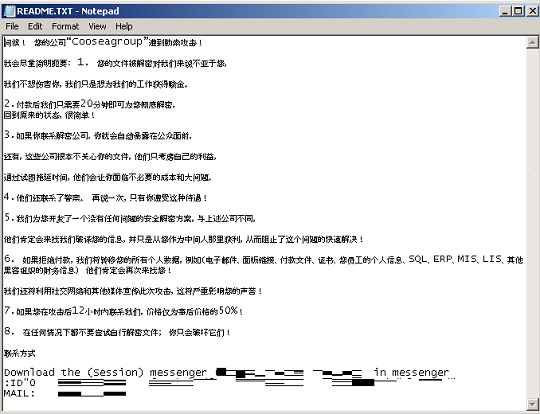Ransom.Win32.BEAST.YPEGI
Ransom:Win32/Beast.YAA!MTB (MICROSOFT)
Windows


Threat Type: Ransomware
Destructiveness: No
Encrypted: No
In the wild: Yes
OVERVIEW
This Ransomware arrives on a system as a file dropped by other malware or as a file downloaded unknowingly by users when visiting malicious sites.
It drops files as ransom note. It avoids encrypting files with the following file extensions.
TECHNICAL DETAILS
Arrival Details
This Ransomware arrives on a system as a file dropped by other malware or as a file downloaded unknowingly by users when visiting malicious sites.
Installation
This Ransomware drops the following files:
- %User Temp%\default.key
(Note: %User Temp% is the current user's Temp folder, which is usually C:\Documents and Settings\{user name}\Local Settings\Temp on Windows 2000(32-bit), XP, and Server 2003(32-bit), or C:\Users\{user name}\AppData\Local\Temp on Windows Vista, 7, 8, 8.1, 2008(64-bit), 2012(64-bit) and 10(64-bit).)
It adds the following mutexes to ensure that only one of its copies runs at any one time:
- BEAST HERE?
Process Termination
This Ransomware terminates the following services if found on the affected system:
- AcronisAgent
- AcrSch2Svc
- backup
- BackupExecAgentAccelerator
- BackupExecAgentBrowser
- BackupExecDiveciMediaService
- BackupExecJobEngine
- BackupExecManagementService
- BackupExecRPCService
- BackupExecVSSProvider
- CAARCUpdateSvc
- CASAD2DWebSvc
- ccEvtMgr
- ccSetMgr
- DefWatch
- GxBlr
- GxCIMgr
- GxCVD
- GxFWD
- GxVss
- Intuit.QuickBooks.FCS
- memtas
- mepocs
- msexchange
- PDVFSService
- QBCFMonitorService
- QBFCService
- QBIDPService
- RTVscan
- SavRoam
- sophos
- sql
- stc_raw_agent
- svc$
- veeam
- VeeamDeploymentService
- VeeamNFSSvc
- VeeamTransportSvc
- VSNAPVSS
- vss
- wscsvc
- wuauserv
- YooBackup
- YooIT
- zhudongfangyu
- MSSQLFDLauncher
- MSSQLSERVER
- SQLSERVERAGENT
- SQLBrowser
- SQLTELEMETRY
- MsDtsServer130
- SSISTELEMETRY130
- SQLWriter
- MSSQL$VEEAMSQL2012
- SQLAgent$VEEAMSQL2012
- MSSQL
- SQLAgent
- MSSQLServerADHelper100
- MSSQLServerOLAPService
- MsDtsServer100
- ReportServer
- SQLTELEMETRY$HL
- TMBMServer
- MSSQL$PROGID
- MSSQL$WOLTERSKLUWER
- SQLAgent$PROGID
- SQLAgent$WOLTERSKLUWER
- MSSQLFDLauncher$OPTIMA
- MSSQL$OPTIMA
- SQLAgent$OPTIMA
- ReportServer$OPTIMA
- msftesql$SQLEXPRESS
- postgresql-x64-9.4
It terminates the following processes if found running in the affected system's memory:
- agntsvc.exe
- encsvc.exe
- isqlplussvc.exe
- apache.exe
- backup.exe
- dbeng50.exe
- dbsnmp.exe
- encsvc.exe
- excel.exe
- firefox.exe
- firefoxconfig.exe
- infopath.exe
- isqlplussvc.exe
- kingdee.exe
- msaccess.exe
- msftesql.exe
- mspub.exe
- mydesktopqos.exe
- mydesktopservice.exe
- mysqld-nt.exe
- mysqld-opt.exe
- mysqld.exe
- ncsvc.exe
- notepad.exe
- ocautoupds.exe
- ocomm.exe
- ocssd.exe
- onenote.exe
- oracle.exe
- outlook.exe
- powerpnt.exe
- sqbcoreservice.exe
- sql.exe
- sqlagent.exe
- sqlbrowser.exe
- sqlserver.exe
- sqlservr.exe
- sqlwriter.exe
- steam.exe
- synctime.exe
- tbirdconfig.exe
- thebat.exe
- thunderbird.exe
- tomcat.exe
- tomcat6.exe
- u8.exe
- ufida.exe
- visio.exe
- winword.exe
- wordpad.exe
- xfssvccon.exe
Other Details
This Ransomware connects to the following URL(s) to get the affected system's IP address:
- https://{BLOCKED}er.co/162c65.torrent51
Ransomware Routine
This Ransomware avoids encrypting files with the following strings in their file name:
- autorun.inf
- boot.ini
- bootfont.bin
- bootmgfw.efi
- bootmgr
- bootmgr.efi
- bootsect.bak
- desktop.ini
- GDIPFONTCACHEV1.DAT
- iconcache.db
- ntdetect.com
- ntldr
- ntuser.dat
- ntuser.dat.log
- ntuser.ini
- thumbs.db
It avoids encrypting files found in the following folders:
- #recycle.EFI
- Boot.EFI
- Microsoft
- $Recycle.Bin
- $Windows.~bt
- $Windows.~ws
- All Users
- AppData
- Application Data
- Avast Software
- Bitdefender
- Boot
- Common Files
- config.msi
- Embedded Lockdown Manager
- GoogleChrome
- inetpublogs
- intel
- Internet Explorer
- Microsoft Help
- Microsoft.NET
- Microsoft
- Mozilla Firefox
- Mozilla
- MSBuild
- MSOCache
- nvidia
- Opera Software
- Opera
- Package Cache
- PerfLogs
- Reference Assemblies
- System Volume Information
- Tor Browser
- Trend Micro
- Windows Defender Advanced Threat Protection
- Windows Defender
- Windows Journal
- Windows Mail
- Windows Media Player
- Windows Multimedia Platform
- Windows NT
- Windows Photo Viewer
- Windows Portable Devices
- Windows Security
- Windows Sidebar
- Windows.old
- Windows
- WindowsPowerShell
It appends the following extension to the file name of the encrypted files:
- .{{GUID}-BCC19668745C}.Cooseagroup
It drops the following file(s) as ransom note:
- {Encrypted directory}\README.TXT

It avoids encrypting files with the following file extensions:
- 386
- adv
- ani
- bat
- bin
- cab
- cmd
- com
- cpl
- cur
- deskthemepack
- diagcab
- diagcfg
- diagpkg
- dll
- drv
- exe
- hlp
- hta
- icl
- icns
- ico
- ics
- idx
- key
- ldf
- lnk
- lock
- mod
- mpa
- msc
- msi
- msp
- msstyles
- msu
- nls
- nomedia
- ocx
- pdb
- prf
- ps1
- rom
- rtp
- scr
- search-ms
- shs
- spl
- sys
- theme
- themepack
- wpx
SOLUTION
Step 1
Trend Micro Predictive Machine Learning detects and blocks malware at the first sign of its existence, before it executes on your system. When enabled, your Trend Micro product detects this malware under the following machine learning name:
-
Ransom.Win32.TRX.XXPE50FFF082
Step 2
Before doing any scans, Windows 7, Windows 8, Windows 8.1, and Windows 10 users must disable System Restore to allow full scanning of their computers.
Step 3
Scan your computer with your Trend Micro product to delete files detected as Ransom.Win32.BEAST.YPEGI. If the detected files have already been cleaned, deleted, or quarantined by your Trend Micro product, no further step is required. You may opt to simply delete the quarantined files. Please check the following Trend Micro Support pages for more information:
Step 4
Restore encrypted files from backup.
Did this description help? Tell us how we did.


